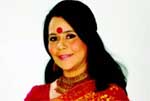 Renowned elocutionist Rupa Chakraborty has been away from limelight in the Bangladesh media. When I at last caught up with her, she was in Heidelberg, Germany. On her return to London we met at trendy restaurant, Kalapata, in White Chapel, London and had an interesting chat on Rupa’s recent involvement in the cultural front as well as her profession.
Renowned elocutionist Rupa Chakraborty has been away from limelight in the Bangladesh media. When I at last caught up with her, she was in Heidelberg, Germany. On her return to London we met at trendy restaurant, Kalapata, in White Chapel, London and had an interesting chat on Rupa’s recent involvement in the cultural front as well as her profession.
An elegant and upbeat Rupa arrived in a bright red jamdani, leaving little doubt in associating her with her pursuits in promoting and performing Bengali elocution at home and abroad.
“I have been working on my Ph.D in syntactic structure (use of proper language structure) of Sylheti dialect, from SOAS, for the last two years,” said the articulate Rupa. “The inspiration came from my Sylheti background, and coincided with my idea of researching a new topic,” she added.
An associate professor at the Institute of Modern Language (IML), Dhaka University, Rupa’s view on her career was insightful:
“At IML, 13 languages, including Bangla, are taught to non-native speakers,” Rupa explains. “My trip to South Korea fuelled my interest in developing simple techniques to teach foreign students. There I came across teachers who had introduced books and CDs that were helpful for foreign students to grasp the language. On my return home, I wrote a 75 chapter book, titled ‘Spoken Bengali’ and commissioned software to be developed to aid in learning spoken Bangla. The book and software were published by the IML, University of Dhaka. Bangla Academy had published a similar book by Jahanara Imam in the 1960s, but it was written in English, and as a majority of the students were not English speakers, it was not very useful for us at the IML,” she continued.
“So my book is written in Bangla, with International Phonetic Alphabet notations used to instruct the reader in pronunciation as well as an English translation for those who can read English.
“The other book Practice Text for Bengali Learners, was published by the University Grants Commission,” added Rupa.
“My book has been appreciated at the Heidelberg University’s department for foreign students,” added Rupa modestly.
How does she combine this project with her passion for poetry? “Poetry runs in my blood. I used to rock to the rhythm of poetry even as a toddler. My father, Dr. Bokul Majumdar, studied under Rabindranath Tagore at Shantiniketan, and eminent scholars such as Mujtaba Ali and others were regular guests at our home. I literally grew up amongst them. So my passion for language and poetry is firmly engrained in my mind.
“During my stay in London, I tried to bring together Bangladeshi expats interested in recitation. Up to then they had been performing individually, now we offered them a larger platform. Soon we set up a recitation group called Punoshcho (Again), comprising 16 members,” she said.
“On Tagore’s 150th anniversary we launched an album featuring 16 of the Tagore’s lesser known works. We sold over 350 CDs on the first day. Poetry recitation gained momentum and generated great interest among Bengali listeners, as this initiative was the first of its kind in Europe.”
Rupa added, “Our dramatic reading of Tagore’s prose ‘Bachoshpati’ from the book ‘Golpo Sholpo’ drew an enthusiastic crowd. This was due to its uncommon approach as it featured words, which have no real meaning, but through expression present a visual image to the listeners.
“We are currently working on an album featuring 15 of the bard’s letters written to different personalities; the callings of his heart in epistolary form. The letters were addressed to Sir Jagadish Chandra Bose, Mahatma Gandhi and also related to Tagore’s trip to the UK and the USA. Some are excerpts of his Harvard speech, while others convey his political and social thoughts and more,” said an enthusiastic Rupa.
Rupa is one of the founding members of the Shanon, an organisation of reciters, now running for 26 years in Bangladesh. “Art goes beyond frontiers,” she adds.
She feels the pulse of Bengali expats in the UK and aims to generate a taste for quality cultural production as Head of News and Programme of the TV channel, Desh that began its journey only recently. In one such programme Rupa interviewed Nobel laureate Amartya Sen.
“Poets are wordsmiths”, she says. “The rhythmic style has the capacity to engage listeners. Through such endeavours, children are encouraged by their parents to take part in activities that represent our culture,” said a content Rupa.
-With The Daily Star input




















